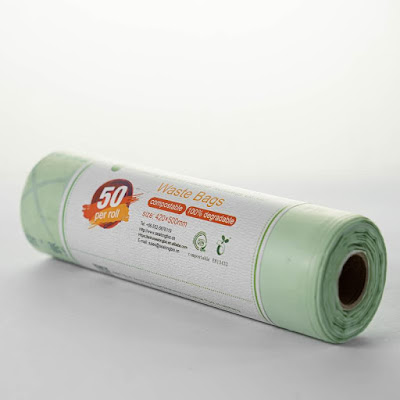Popular Science Knowledge About Degradable Plastics
Biodegradable Plastic
Biodegradable plastics are commonly produced with renewable raw materials, micro-organisms, petrochemicals, or combinations of all three. Biodegradable plastics are plastics that can be decomposed by the action of living organisms, usually microbes, into the water, carbon dioxide, and biomass.
While the words "bioplastic" and "biodegradable plastic" are similar, they are not synonymous. Not all bioplastics are biodegradable.
What is Biodegradable Plastic Made of?
Biodegradable plastics are made from all-natural plant materials. These can include corn oil, orange peels, starch, and plants. Traditional plastic is made with chemical fillers that can be harmful to the environment when released when the plastic is melted down.
How Long do Biodegradable Bags take to Decompose?
- three to six months.
Biodegradable plastics take three to six months to decompose fully. That's much quicker than synthetic counterparts that take several hundred years. Exactly how long a biodegradable bag takes to break down depends on various factors, such as temperature and the amount of moisture present.
Is Biodegradable Plastic Good For the Environment?
Plastics that are currently marketed as “biodegradable” will themselves contribute to plastic pollution if they are lost or littered. They do not break down as quickly and completely in the environment as the term might imply and can thus harm wildlife and ecosystems.
Difference
Compostable vs Degradable and Biodegradable Bags
What is the difference between compostable, degradable, and biodegradable? Which bin should you place them in?
- COMPOSTABLE
Compostable bags are made of natural plant starch and do not produce any toxic material. Compostable bags break down readily in a composting system through microbial activity to form compost. In order to be lassified as compostable, they must meet the Australian Standard for compostability AS4736 and will have this symbol.
Which bin? Compostable bags can be used to line your kitchen caddy for the collection of food scraps and then placed into the green lidded food and garden organics (FOGO) bin.
Don't waste them in your general waste bin as they will not compost well in a landfill environment.
- DEGRADABLE
Degradable bags are made from plastic with other chemicals added (including heavy metals) that cause the plastic to break down and disintegrate over time when exposed to sunlight and heat. If degradable bags are released into our environment they become quite problematic as they break down into hundreds of tiny pieces of plastic. Animals can consume smaller pieces of plastic more readily than they would if the bags were still whole. It is also much more difficult to remove hundreds of tiny pieces of plastic from the environment than it is to remove a single bag.
Degradable bags should only be used for and placed into your general waste bin.
- BIODEGRADABLE
Like degradable bags, biodegradable are often still plastic bags that have microorganisms added to break down the plastic.
Which bin? Biodegradable bags should only be used for and placed into your general waste bin.
For more science knowledge about degradable plastics or bioplastic products, please check here.





Comments
Post a Comment